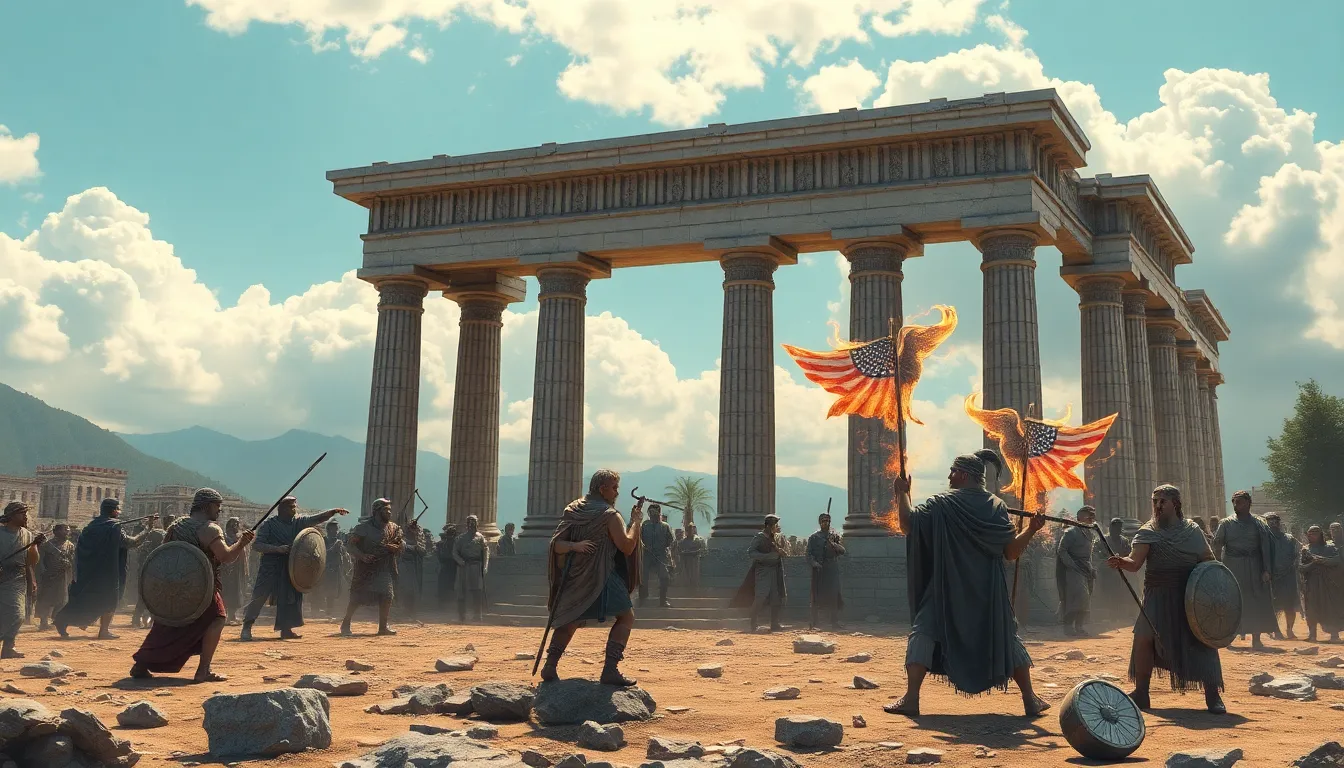The Myths of the Trojan War: Gods and Mortals Intertwined
I. Introduction
The Trojan War is one of the most famous tales in Greek mythology, characterized by its rich narrative and complex characters. It serves as a backdrop for themes of love, honor, betrayal, and vengeance. The interplay between gods and mortals adds a unique dimension to the story, reflecting the values and beliefs of ancient Greek culture.
Understanding this interplay is crucial, as it highlights how divine intervention influenced human decisions and the outcome of events. This article aims to debunk common myths associated with the Trojan War while exploring the narratives that have captivated audiences for centuries.
II. Historical Context of the Trojan War
The timeline of the Trojan War is shrouded in legend, with most accounts dating back to the late Bronze Age, around the 12th century BCE. The war is primarily documented in the epic poems attributed to Homer, namely the “Iliad” and the “Odyssey.” However, the precise historical events surrounding the war remain debated among scholars.
Archaeological evidence from sites such as Hisarlik in modern-day Turkey suggests that a conflict may have taken place, though the details remain elusive and often romanticized. The significance of the war in ancient Greek culture cannot be overstated; it represented the struggle between noble ideals and the chaos of human emotion.
III. The Role of Gods in the Trojan War
The Trojan War is marked by the significant involvement of major deities, each with their own agendas and loyalties. Key figures include:
- Zeus: The king of the gods, whose decisions often swayed the tide of battle.
- Hera: Zeus’s wife, who harbored a deep resentment towards Troy and supported the Greeks.
- Athena: The goddess of wisdom, who sided with the Greeks due to her grudge against Paris.
- Aphrodite: The goddess of love, who aided the Trojans after Paris awarded her the golden apple.
This divine intervention often manifested in direct support or manipulation of mortal actions, illustrating the concept of fate intertwined with free will. Key episodes showcasing this influence include:
- The Judgment of Paris, leading to the abduction of Helen.
- Athena’s guidance of Achilles in battle.
- Zeus’s decisions that impacted the outcomes of various skirmishes.
IV. The Mortals of the Trojan War
The narrative of the Trojan War is driven by several key mortal figures whose motivations and conflicts add depth to the story. Notable characters include:
- Achilles: The greatest Greek warrior, whose wrath and personal vendettas influenced the course of the war.
- Hector: The noble Trojan prince, representing honor and duty to his city.
- Helen: Often blamed for the war, her role highlights themes of desire and consequence.
- Agamemnon: The leader of the Greek forces, whose pride leads to significant conflict with Achilles.
These characters are not just pawns in a divine game; their personal motivations—such as love, honor, revenge, and pride—drive the narrative forward. The impact of divine favor or wrath on their decisions is apparent, leading to tragic outcomes that resonate through the ages.
V. Myths vs. Reality: The Blurring Lines
As with many myths, the tales of the Trojan War have shaped perceptions of historical events, often blurring the lines between fact and fiction. The embellishments of oral tradition, coupled with later adaptations by playwrights and poets, have contributed to the mythos surrounding the war.
Key aspects of this blurring include:
- The portrayal of gods as active participants in human affairs.
- Exaggerated accounts of heroism and valor.
- Interpretations that reflect the values and morals of the time they were written.
Understanding these distinctions is essential for appreciating the cultural significance of the myths while recognizing their roots in historical events.
VI. The Legacy of the Trojan War Myths
The myths surrounding the Trojan War have had a profound influence on literature and art throughout history. From ancient Greek tragedies to modern novels and films, the themes and characters have been reinterpreted countless times. Some notable influences include:
- Homer’s “Iliad” and “Odyssey,” foundational texts of Western literature.
- Virgil’s “Aeneid,” which connects the Trojan War to the founding of Rome.
- Modern adaptations in films such as “Troy” and “Helen of Troy.”
In contemporary culture, the Trojan War symbolizes various themes such as the consequences of pride, the complexity of love, and the tragedy of war. It serves as a reminder of the human condition, transcending time and space.
VII. Conclusion
In summary, the myths of the Trojan War reveal the intricate relationship between gods and mortals, showcasing how divine influence shaped human actions and decisions. The interplay of personal motivations, fate, and divine intervention creates a rich tapestry that continues to fascinate audiences today.
The enduring appeal of the Trojan War lies in its exploration of timeless themes that resonate with the human experience. From love and honor to betrayal and revenge, these narratives provide valuable lessons that remain relevant in contemporary society.
VIII. Further Reading and Resources
For those interested in exploring the Trojan War further, the following resources are recommended:
- Books:
- “The Iliad” by Homer
- “The Odyssey” by Homer
- “The Song of Achilles” by Madeline Miller
- “Troy: A History” by David Stuttard
- Online Resources:
- Academic Studies:
- “The Trojan War: A New History” by Barry Strauss
- “The Trojan War: A Very Short Introduction” by Eric H. Cline




